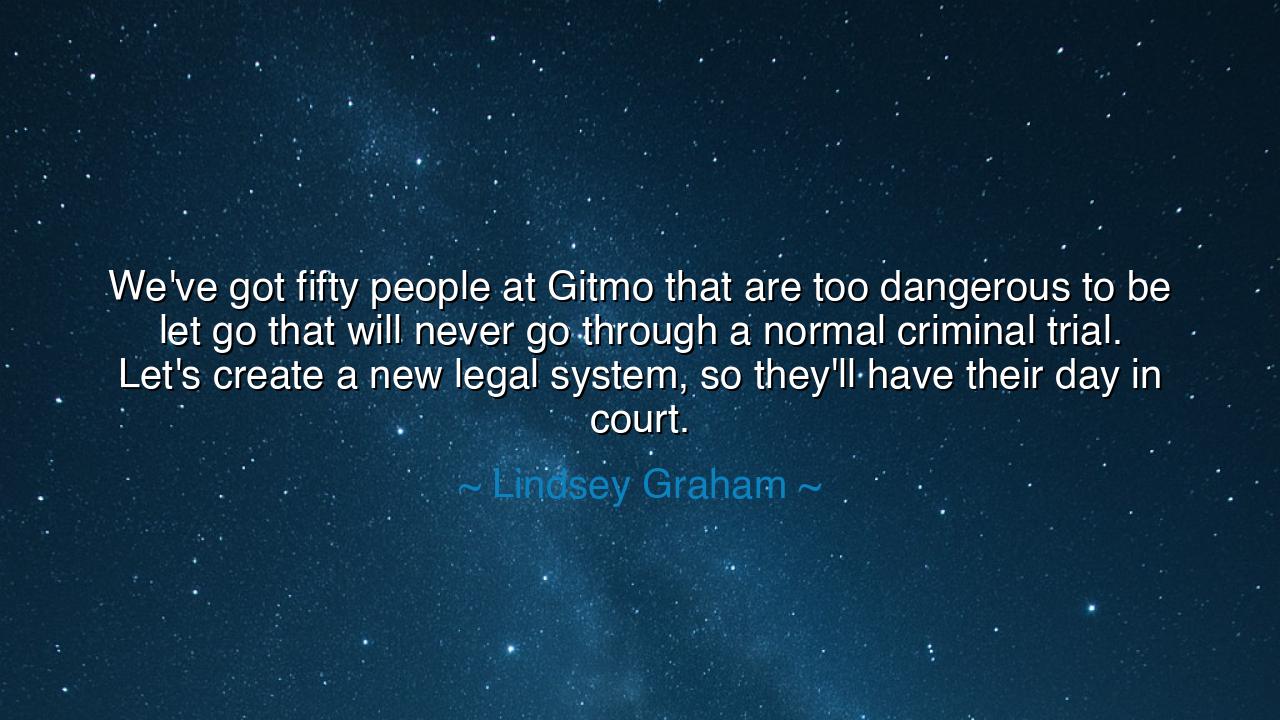
We've got fifty people at Gitmo that are too dangerous to be let
We've got fifty people at Gitmo that are too dangerous to be let go that will never go through a normal criminal trial. Let's create a new legal system, so they'll have their day in court.






When Lindsey Graham declared, “We’ve got fifty people at Gitmo that are too dangerous to be let go that will never go through a normal criminal trial. Let’s create a new legal system, so they’ll have their day in court,” he spoke from the heart of a nation caught between justice and fear, law and necessity. His words rise from one of the most turbulent crossroads in modern history — the age of Guantánamo Bay, where questions of morality, legality, and security converged into one haunting dilemma: How does a free nation uphold its values while protecting itself from those who seek its destruction? In his statement lies both a confession and a challenge — a recognition that the old systems of justice were ill-fitted for the new realities of war and terror.
The origin of this quote lies in the aftermath of the attacks of September 11, 2001, when the world stood trembling in the shadow of a new kind of enemy — not a nation, but an idea, an ideology without borders. The United States found itself holding detainees accused of plotting against it, yet traditional courts could not handle their cases, for much of the evidence was secret, gathered in the dark webs of intelligence, or through methods that could not withstand public scrutiny. The Guantánamo Bay detention camp, or “Gitmo,” became a symbol of both protection and controversy — a fortress built in the name of safety, yet one that raised deep questions about freedom and fairness. Graham’s words reflect the effort to bridge this chasm, to find a path between justice and survival, between the principles of law and the necessities of defense.
When he says, “Let’s create a new legal system,” Graham invokes the spirit of founders and reformers throughout the ages who, faced with unprecedented challenges, crafted new frameworks to preserve the moral integrity of their civilizations. In ancient Rome, when the Republic was threatened by enemies and conspiracies, Cicero cried out that the safety of the state was the highest law — salus populi suprema lex esto. Yet even then, Rome struggled to balance mercy with strength, legality with expediency. Graham’s proposal echoes that same eternal struggle — to construct a system of justice for the dangerous and untried, so that even those accused of grave evil would not be condemned without process. For in his words lies an admission that justice cannot be denied, even to the guilty, if a society wishes to remain just.
The essence of his statement reveals a deep truth: fear tests the foundations of civilization. When nations are threatened, their first impulse is to act swiftly, often harshly, to defend themselves. Yet the wise know that without law, power becomes corruption, and without compassion, law becomes cruelty. By calling for “a new legal system,” Graham sought not to abandon justice, but to reimagine it, to craft something that could withstand both the scrutiny of morality and the demands of security. His words are not those of vengeance, but of pragmatism — an acknowledgment that the structures of peace must sometimes evolve to guard against the instruments of war.
Throughout history, we see this pattern repeated. When Abraham Lincoln suspended habeas corpus during the Civil War, it was not from hatred of liberty but from desperation to preserve the Union. When Churchill authorized special tribunals to deal with Nazi spies during World War II, it was done to protect Britain from collapse. In each of these moments, leaders faced the same paradox: how to defend the law while bending it to survive. Graham’s words stand within this lineage of moral complexity — the difficult wisdom that freedom must sometimes fight for its own existence.
Yet, the shadow of his quote also reminds us of the danger that such measures can bring. For every system created in fear risks becoming a tool of oppression in calmer times. History warns us that exceptional powers, once granted, are rarely relinquished. The Romans learned this when temporary powers given to defend the Republic gave birth to the Empire. So too must modern societies guard their hearts: the defense of freedom must never become the destruction of it. In seeking new systems of justice, we must ensure they do not become instruments of perpetual suspicion or cruelty.
Thus, the lesson of Graham’s words is one of balance and vigilance. Every generation will face threats that test the moral fabric of its laws. The wise must neither cling blindly to old systems nor abandon the ideals that give those systems meaning. Let each citizen remember: justice is not convenience; it is the conscience of civilization. To create new laws, new courts, or new systems is sometimes necessary, but they must always be rooted in the eternal principle that every human being — even the enemy — is entitled to be seen and judged in the light of fairness. For as long as justice breathes within a nation, no terror, no prison, no fear can destroy its soul.






AAdministratorAdministrator
Welcome, honored guests. Please leave a comment, we will respond soon